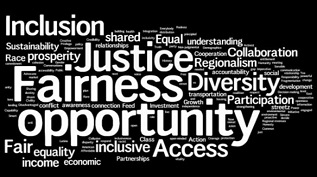Surdna Foundation’s Commitment to Social Justice

The Surdna Foundation recently published, “Social Justice at the Surdna Foundation,” which outlines our commitment to social justice. This has required difficult and ongoing conversations, a broad understanding of long-term systemic change, and acknowledgement that the work will never be “done.”
Here are a few highlights from the report:
Social Justice as our North Star
Surdna’s commitment to social justice requires us to look holistically at the full range of challenges that communities face. We promote adaptable and responsive strategies that are transformative, and not merely transactional. Our theory of change asserts the importance of building power and supporting leadership in marginalized and underserved populations. If we are to achieve true equity, fairness, and justice, all people must have equal access to necessary resources and opportunities.
To accomplish our goal, we invest in organizations that work to dismantle persistent patterns of inequality and transform the systems and institutions that perpetuate injustice, especially in communities of color and low-income communities.
“Naming social justice defines who we are and how we show up. It makes us accountable for holding our values upfront, and in our role as learners and partners.”
Kelly Nowlin, Surdna Board Member
Working in this space, we constantly ask ourselves tough questions about power and wrestle with our institutional privilege. We strive to be thoughtful listeners motivated not merely by one-off opportunities, but by long-term sustainable impact. Our society is built upon layers of injustice that are multifaceted and multi-generational; the solutions must be as well.
“Surdna doesn’t only want to fund the shiny things. They listen to grantees and not what’s trendy. They learn and grow with us around what the needs are with deep listening and partnership, which is refreshing and really puts us at ease as things change rapidly on the ground. They are learning as much as we’re learning.”
Rahwa Ghirmatzion, Surdna Grantee, PUSH Buffalo
Although Surdna’s approach to philanthropy has long focused on social justice, taking such an approach has been a learning experience. We found that contemplating and carrying out social justice-oriented work necessitated a continuous conversation. Our willingness to tackle social justice issues has added a rich authenticity and broad understanding to the work of long-term systemic change.
It is not easy to reflect on the privileges we carry as people and as representatives of the Foundation. Surdna represents the interests of a white, wealthy family while working to resolve issues that predominantly affect low-income people and people of color.
Our clarity of focus on social justice issues has helped to attract staff and board members (including non-family board members who have diverse backgrounds and lived experiences) who are committed to the work and who can ensure that we continue to meet our goals and follow through on our mission. It has been particularly useful for us to recruit individuals who can challenge and inspire us to approach this work with humility, openness, and a willingness to recognize our shortcomings.
“What it means to be a social justice institution in this particular time is to double down on commitments and values, and understand that systemic change is the work of social justice. Social justice is not a service that you do for people. It is completely transforming the power dynamics that have been responsible for creating unjust circumstances, and putting those who have been most impacted in front to transform the system.”
Kellie Terry, Surdna Program Officer, Sustainable Environments
Surdna’s mission emphasizes a cross-issue approach that considers multiple social and economic factors alongside environmental degradation and disinvestment in low-income communities and communities of color. Our analysis directly addresses the roles played by place, race, economics, culture, and the environment, and we do whatever we can to ensure that our grant investments operate in alignment. Following these practices has made us a smarter, more effective, and more adaptable funder.
Social Justice Philanthropy at Surdna – Recent Approaches
We keep the principles of social justice in mind as we identify our grantmaking priorities, build the process for engaging and partnering with communities, and approach investing our endowment. Some examples include the following:
- The Amplify Fund – Through a multi-million-dollar funder collaborative, we will focus on amplifying the voice, power, experience, and authority of residents in low-income communities to engage in decision-making on issues that impact their lives.
- Investing in Social Justice – In 2013, we began leveraging program related investments (PRIs) — investments that support social or charitable purposes with the return of capital.
More recently, in 2017, we announced that our foundation would allocate $100 million — approximately 10 percent of our corpus — to impact investments. We know that this commitment comes with the responsibility to share our successes and failures, and do the best we can to enrich the broader field of philanthropy.
- Supporting Communities for the Long Haul – Following Hurricane Katrina, Surdna partnered with over fifty grantee organizations and invested over $12.5 million in New Orleans with a focus on including community voices in the rebuilding efforts.
Social Justice and the Future
The Foundation has followed a remarkable trajectory, from one man’s vision, to a family’s commitment, to a broader social calling in a national landscape that desperately needs each of us to engage, to the best of our abilities, in building a more just and equitable future.
To learn more about Surdna’s long-term commitment to social justice read the narrative in its entirety here.
